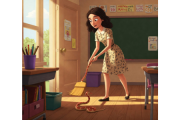Quinta Tecka was our second Caracas home, a substantial house built on a grand scale in El Rosal, on a main street, Avenida Principal de Las Mercedes. We never knew its owner, but he was rumoured to have been an elderly former rancher. On the front lawn I rode my beloved English tricycle with its big wheels and boot (trunk) with a curved lid, until it was stolen one morning, to my intense grief, while I left it unattended. The house had a capacious recessed and sheltered front balcony, where we children had afternoon tea with biscuits and watched passing traffic. To my consternation once, while I was drawing at the balcony table, I saw my mother at the wheel of our Vauxhall enter the driveway and go into the house, to emerge moments later with her purse, leaving a policeman sitting in the seat beside her. She paid him some money, and he left. She had run out of gas in Sabana Grande, a traffic offence, he told her, for which the fine was treinte bolivares. When she handed him two twenty-bolivar notes, she expected Bs.10 change and a ticket for the offence. He handed her back neither, but walked away with a forty-bolivar bribe, and no doubt a smile at her gullibility. Petty crime of this sort is not unknown in Africa, India and Russia today, and almost certainly persists in Venezuela.
From this same balcony, my mother loved to watch for frequent Cadillacs with their enormous tailfins sailing glamorously down the Avenida to join the Autopista del Este (an east-west highway built by ‘PJ’ a few years before), or continue on past the AutoMercado in Las Mercedes, near where our first Caracas home, Quinta Marden, a bungalow, was located. The AutoMercado was an early shopping centre where you could buy books, magazines, and newspapers in English. The Avenida ended at the impressive Hotel Tamanaco, named for an indigenous cacique, or tribal chief, at avenue’s end. The hotel is still there: it is on its balcony overlooking the swimming pool that I vividly recall seeing a delegation of visiting uniformed and bearded fidelista soldiers, complete with military swagger and fearsome weaponry slung on their shoulders, surveying the scene of the bustling city below them shortly after Castro came to power in Cuba, no doubt expecting the imminent demise of capitalism in what was then by far the most prosperous South American economy of all. Their followers’ expectations proved premature in 1960, but a mere generation later they had the satisfaction of clasping Comrade Chavez to their hairy chests, while their doctors laboured in vain to save his life when he was dying a martyr’s death, from cancer, in 2013.




